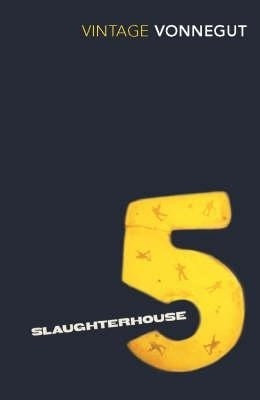 Age Group: Adult
Age Group: AdultGenre: Who knows
Pub Date: 1950
Publisher: Vintage
“All this happened, more or less.” The first line of Slaughterhouse-Five is a warning of how Vonnegut will blur the lines between fiction and reality throughout the book.
The narration of Slaughterhouse-Five is a peculiar one. This is a fine example of meta-fiction, the first chapter follows the author (who we can presume to be Vonnegut, but could be as fictional as the Tralfamadorians who turn up later in the book) and then of his book, The Children’s Crusade, which is about a World War II soldier, Billy Pigram, and his time-travels through past, present, and future. Oh yeah, and there are aliens. And the author keeps turning up in the novel that he has written.
It’s all a bit confusing at first.
It feels like Vonnegut is trying to make a statement. And that statement is to abandon everything you think you know. The reason Slaughterhouse-Five was so initially confusing was because I kept trying to label it in my head. “Okay,” I thought, “This is a meta-fictional, black comedy, war story”. And then time-travel appeared. And then the Tralfamadorians turned up.
Once you give up on trying to understand the story, you can focus more on what the story is trying to say. And it says a lot of important things.
At the heart of it, Slaughterhouse-Five is a war story, and although there are a lot of comedic elements to it, the recurring reminder of death (so it goes) is through it. The awful events of Dresden seriously affects Billy Pilgrim, so much that it distorts his reality through post-traumatic stress. Vonnegut paints it clear that he does not condone war at all, and that although this is a work of fiction, the self-referencing in the times of war shows that he knows what he’s talking about.
Then there’s the concept of time. And the helplessness you have against it. Billy Pilgrim is zapped around time without having any control over it, but there’s some hope within it. As time is presented as non-linear, yet set completely in stone, the Tralfamadorians remind us although we can chose to dwell on the bad times presented at us, we should also remember the good. Or Vonnegut could be saying that this is just an excuse for ignoring the horrors in front of us.
Different people will take different things from Slaughterhouse-Five, just as people have different opinions on Billy Pilgrim. Was he deluded? Suffering from post-traumatic stress? Or did he really see aliens? With the blurred lines between fiction, genres, and reality, we will never know, but Vonnegut gives us plenty to think about.
Rating: 8/10

No comments:
Post a Comment